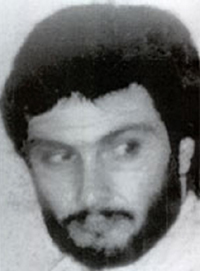Top Hezbollah commander killed in Syria blast
Updated: 2008-02-13 19:01
 Top Hezbollah commander Imad Moughniyah is seen in this undated photo from the US Federal Bureau of Investigation (FBI) website. [Agencies]
|
DAMASCUS, Syria -- One of the world's most wanted and elusive terrorists, Imad Mughniyeh, was killed in a car bombing in Syria nearly 15 years after dropping from sight. The one-time Hezbollah security chief was the suspected mastermind of attacks that killed hundreds of Americans in Lebanon and of the brutal kidnappings of Westerners.
The Lebanese Shiite militant group Hezbollah and its top ally, Iran, blamed Israel on Wednesday for the assassination. Israel denied any role.
Mughniyeh was also on the FBI's list of most wanted terrorists, and the US State Department had offered a $5 million reward for information leading to his arrest or conviction. He was indicted in the US for his role in planning the 1985 hijacking of a TWA airliner in which a US Navy diver was killed.
The United States welcomed Mughniyeh's death.
"The world is a better place without this man in it," State Department spokesman Sean McCormack said. "One way or the other, he was brought to justice."
The hijacking was the only attack on Americans for which Mughniyeh was charged, but he carried out or directed a series of terrorist spectaculars aimed at the United States and Jewish targets.
Mughniyeh's death was the latest in a series of blows to major terror figures in recent weeks. Abu Laith al-Libi, a senior al-Qaida leader, was killed in Pakistan in late January by a missile fired from a US drone. This week, Pakistani security forces critically wounded and captured Mansour Dadullah, a top Taliban figure, in a firefight near the Afghan border.
But Mughniyeh, a Shiite Muslim not known to be connected to the Sunni al-Qaida or Taliban, harkened back to an earlier era of terror. A secretive, underground operator whose name was not even known for years, he was one of the first to turn Islamic militancy's weapons against the United States in the 1980s.
Mughniyeh emerged during the turmoil of Lebanon's 1975-1990 civil war, rising to become Hezbollah's security chief, and the dramatic suicide bombings he is accused of engineering in Beirut were some of the deadliest against Americans until al-Qaida's Sept. 11, 2001 attacks.
He vanished in the early 1990s, reportedly undergoing plastic surgery and moving between Lebanon, Syria and Iran on fake passports. But Western intelligence agencies believe he then took his terror attacks abroad, hitting Jewish and Israeli interests in Argentina, among other places.
One Western official, speaking on condition of anonymity to discuss intelligence matters, said Wednesday that Mughniyeh was linked to the 1996 bombing of the Khobar Towers in Saudi Arabia, an attack which killed 19 Americans.
Mughniyeh continued to head external operations for Hezbollah and was "very active and very dangerous," the official said.
His slaying could raise tensions between Israel and Hezbollah, as well as with the militant group's allies, Syria and Iran. Israel and Hezbollah fought a bloody war in the summer of 2006, and some Lebanese figures close to the Shiite militant group called Wednesday for attacks against Israel in retaliation for Mughniyeh's death.
It could also worsen the turmoil in Lebanon, where Hezbollah is locked in a power struggle with the US-backed government.
Hezbollah called for a huge turnout at Mughniyeh's funeral in south Beirut on Thursday. The same day, government supporters are planning a rally of hundreds of thousands in downtown Beirut to mark the third anniversary of the assassination of former Prime Minister Rafik Hariri.
|
||
|
|
|
||
|
||
|
|
|
|


